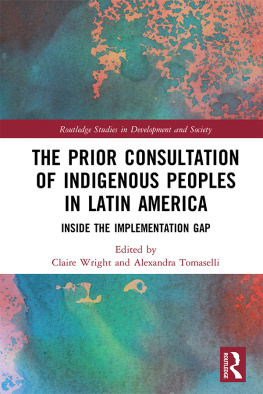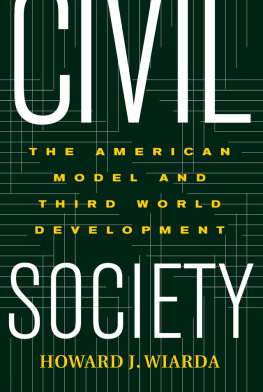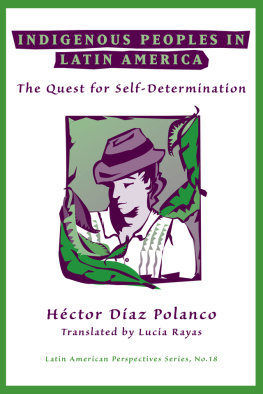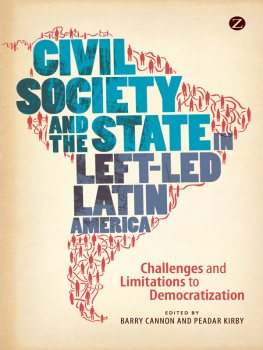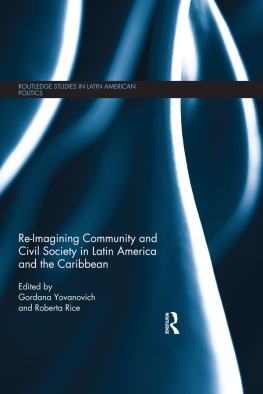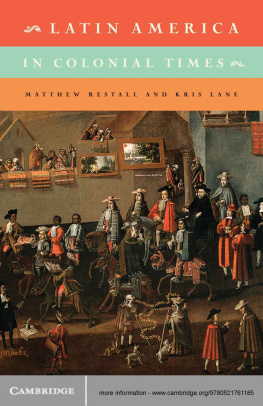INDIGENOUS PEOPLES,
CIVIL SOCIETY, AND THE
NEO-LIBERAL STATE IN
LATIN AMERICA
Edited by
Edward F. Fischer
First published in 2009 by
Berghahn Books
www.berghahnbooks.com
2009, 2010 Berghahn Books
Paperback reprinted in 2010
First ebook edition published in 2012
Originally published as a special issue of Social Analysis, volume 51, issue 2.
All rights reserved.
Except for the quotation of short passages for the purposes of criticism and review, no part of this book may be reproduced in any form or by any means, electronic or mechanical, including photocopying, recording, or any information storage and retrieval system now known or to be invented, without written permission of the publisher.
Library of Congress Cataloging-in-Publication Data
/
edited by Edward F. Fischer.
p. cm.
Includes bibliographical references and index.
ISBN 978-1-84545-597-2 (pbk. : alk. paper) -- ISBN 978-0-85745-547-5 (ebk.)
1. IndiansGovernment relations. 2. Indians, Treatment ofLatin America. 3. Indianssocial conditions. 4. Civil societyLatin America. 5. NeoliberalismLatin America. I. Fischer, Edward F., 1966.
E65.I476 2009
323.119708dc22
2008041448
British Library Cataloguing in Publication Data
A catalogue record for this book is available from the British Library.
ISBN 978-1-84545-597-2 paperback
ISBN 978-0-85745-547-5 ebook
ACKNOWLEDGMENTS
This volume brings together anthropologists, historians, and activists to address the complicated and multi-faceted role that civil society plays in indigenous politics in Latin America. The contributors bring on-the-ground ethnographic approaches to the topic that are especially well-suited to describe the multiple ways that grass-roots indigenous activism works through civil society. It has been a pleasure to work with these authors, each of whom advances our understanding in novel and often surprising ways. Their sharp analyses and rich descriptions make this volume an important contribution to the field.
The late Kingsley Garbett first proposed the idea that this collection be published as a special issue of the journal Social Analysis. Without his support and vision, this project would never have come about. After Kingsley's death, Bruce Kapferer took over the editorship of Social Analysis, and his sharp eye helped direct many useful revisions to see the publication through to completion.
This volume would not have been possible without the collaboration of a number of colleagues. Conversations with Jan Rus and Peter Benson helped me formulate key parts of the introduction and shaped the direction of the work as a whole. Jan never fails to inspire the best in authors, and this work is no exception. I trust Peter's sensibilities implicitly, and his support helped me finalize this endeavor. The introduction and shape of the volume as a whole were also influenced by exchanges with Marta Casas, Demetrio Cojt, Alberto Esquit, Tim Smith, Kedron Thomas, and the anonymous reviewers. Special thanks go to Roddy Brett, Daniel Reichman, and Sarah Lyon for their valuable feedback. As always, Norma Antilln and Laurie Fleming deserve more recognition than I am able to offer for their logistical and editorial support.
At Berghahn, Shawn Kendrick's editing of both substance and style greatly improved all of the chapters; she elevates editing to an art form. Also at Berghahn, Ann Przyzycki and Marion and Vivian Berghahn provided invaluable assistance.
Finally, Mareike Sattler, my wife, not only put up with my usual writing neuroses but did an outstanding job of compiling the index.
Ted Fischer
Nashville, Tennessee
INTRODUCTION
Indigenous Peoples, Neo-liberal Regimes,
and Varieties of Civil Society in Latin America
Edward F. Fischer
Civil society is a slippery concept, and therein lies much of its appeal. By meaning many things to many people, it is one of those frequently invoked yet strategically ambiguous ideas that have real traction, not only in the rarefied world of professional journals, but also in the arena of public policy and political practice. Much of the recent literature on civil society has come from political science. But anthropology (ethnography in particular) has a lot to offer by documenting the on-the-ground diversity of civil society. The leitmotif that emerges from the chapters in this collection is that civil society takes many forms, with multiple, sometimes contradictory, social and political valences. Focusing on its complexities and vernacular forms moves us toward a more nuanced view of the potentials and pitfalls of civil society.
The allure of the concept of civil society also stems from its triangulation of traditionally progressive and traditionally conservative stances. It invokes the noble empowerment of marginalized peoples as well as the retraction of government obligations. It conjures possibilities for voluntary associations and grass-roots organizations as well as increased power of unelected officials and economic interests. Civil society's surge in importance has allowed Latin American indigenous communities access to funding, national and international awareness, and in some cases increases in de facto and de jure autonomy. At the same time, the rise in the importance of civil society goes hand in hand with the rise of neo-liberal political and economic reforms that threaten the material bases of indigenous culture and expose populations to the fickle fashions of First World funding and constraints on time and energy.
To what extent, then, does civil society serve as a space for what Foucault (1991) calls governmentality? Civil society allows the expression of collective will, of hopes and aspirations for the future, along with a sense of choice, self-determination, and empowerment. But this space of expression and agitation also fits into social and political relations in a way that buttresses claims of inclusion and representativeness while still upholding a particular status quo. Working through what Fischer and Benson (2006) have termed limit points, civil society can co-opt and corrupt movements of resistance and utopian narratives by providing a foreshortened yet feasible alternative. At the same time, trying to co-opt resistance is a risky business: as Giddens (1984) observes, such elements may begin to structure the system itself in ways not foreseen. In this light, civil society also provides a radically democratic position from which marginalized peoples can exert influence on policies and practices. This is not an either-or proposition. The complexity of civil society resides in its quantum-mechanical aspect: simultaneously a point of resistance and of hegemonic collusion, civil society is formed from a contradiction that cannot be reconciled. The ethnographic challenge, then, is to represent this complexity without trying to force a synthesis of the thesis and antithesis.
In recent years, the concept of civil society has received a lot of attention from political scientists, economists, and sociologists but less from anthropologists. To be sure, ethnographers have observed and analyzed the impacts of civil society institutions on the communities they study, but they often do so outside of the paradigm of civil society studies. If we conceive of ethnography not just as a methodology but as epistemologyas the dialectic construction of knowledge through an engagement with the fieldthen it is all the more necessary for the study of paradigm-bending vernacular forms of civil society. Kapferer (2000: 189) sees fieldwork as an attitude and a means to break the resistance of the anthropologist's own assumptions, prejudices and theories, wherever the site of origin, concerning the nature and reason of lived realities. Indeed, herein resides the power of ethnographya means of breaking down preconceptions and forcing an engagement with the lived reality of practice. And it is through such an approach that we sometimes come to unsettling conclusions about social forms that we are apt to celebrate.





